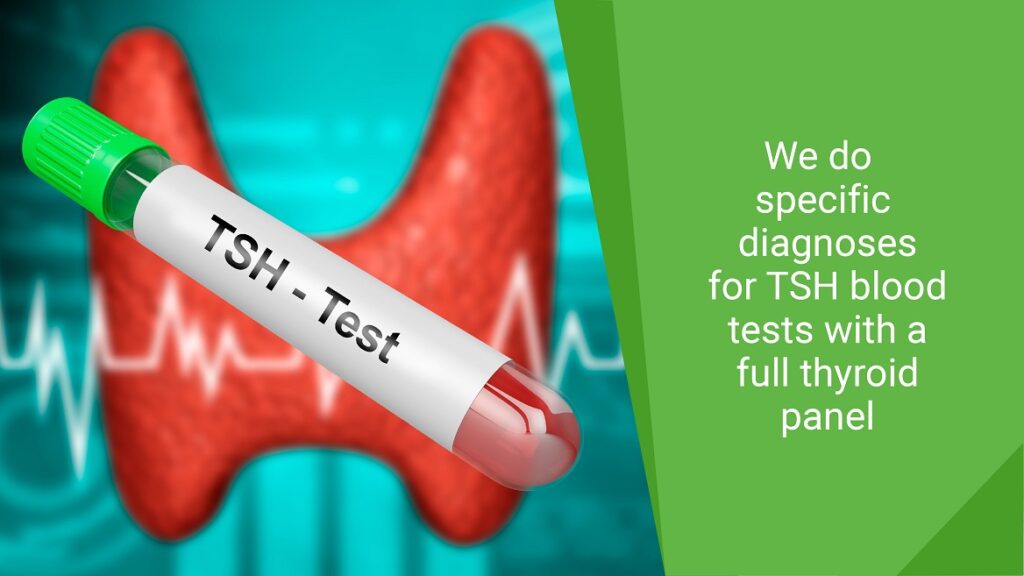The thyroid is an important part of our bodies, and hormonal imbalance causes a variety of problems. Lab owners interpret its symptoms with different scales of measurement. Often, results go wrong, and a TSH test is the reason for overdosing patients. There are different factors affecting your thyroid results. Being prepared for the diagnostic tests for thyroid procedures helps in getting accurate readings, and the correct line of treatment from your doctor.
Avigna Diagnostics ensures evaluation accuracy so that the treatment is not hampered by bad prescriptions. We do specific diagnoses for TSH blood tests with a full thyroid panel. The doctor is able to guide the patient to good health and optimal hormonal balance.
Thyroid Disorders
This is a butterfly-shaped gland in the neck region of the body. It releases the T3, T4 and Calcitonin. The hormones are secreted by the pituitary gland. The disorders are increasing in many people due to a lack of nutrition and other therapeutic reasons.
It is important to balance:
- The Basic Metabolic Rate (which indicates weight loss or gain in the body)
- Respiration
- Blood pressure and heart rate
- Renal function and the rate of Glomerular filtration
- Skin, hair follicles, and nail growth
- Metabolism of calcium, fats, protein, carbohydrates
Before getting the prescription
The normal level for TSH is 0.35 to 4.5 milli-international units per litre (mIU/l) of blood. It is an indicator of how the body is functioning, as per the pituitary gland. An imbalance occurs for diverse reasons which could be autoimmune diseases, medicines, or thyroid disease. A patient may have an enlarged thyroid. The lab technician will conduct a diagnostic TSH blood test if requested by the doctor. If the reading or measurement is below or above the normal range, it indicates a problem.
An overactive thyroid is called hyperthyroidism. Its common symptoms are:
- Intolerance to heat
- Loss of weight
- Sometimes an increase in appetite
- Difficulty in sleeping
- Palpitating heart
If the TSH level is high (Hypothyroidism) the symptoms include:
- Constipation
- Intolerance of cold
- Problems in losing weight
- Fatigue
- Dryness in the skin
Common Diagnostic Tests for Thyroid
- A T4 test
- A T3 test
The doctor may even ask for a thyroid antibody test for an autoimmune condition. Ask him about things to avoid before taking appointments with the lab. The medication is for the long term. Hence, taking them on time is recommended. The right medication absorption is essential for the correction of hormonal levels. It will improve the lab results.
- Know when to consider taking medicine for the accuracy of tests.
- If it is for T4, take a stable dose as recommended by the doctor.
- For T3, let there be a gap of 3-4 hours before the level evaluation.
Preparation for high-risk patients
A blood test is conducted after the patient has fasted for about 14 hours. If the patient is already on thyroid medication, then the test should be done in the same manner and at the same time.
In order to get the correct measurements, patients should be aware of the following:
- Family history of thyroid diseases
- Autoimmune diseases
- Genetic conditions like Down Syndrome
- Neck Irradiation
- Patients on medicines like amiodarone and lithium therapy
- Women who have crossed 35 years of age
- Pregnant women (3rd trimester) postpartum and after delivery of the baby
At Avigna Diagnostics, we take care of all possibilities to help patients recover with the correct results. Our labs are now open in Hyderabad, Tirupati and Visakhapatnam for bookings and appointments online.
Related Keywords:
Blood Test, Hypothyroidism, Tests for Thyroid, Thyroid, Thyroid Disease, Thyroid Results, Thyroid Test, TSH, TSH Blood Test











Comments by admin